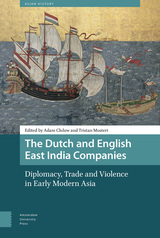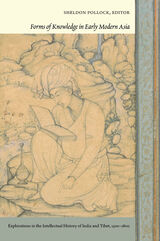2 books about Early Modern Asia

The Dutch and English East India Companies
Diplomacy, Trade and Violence in Early Modern Asia
Edited by Adam Clulow and Tristan Mostert
Amsterdam University Press, 2018
The Dutch and English East India Companies were formidable organizations that were gifted with expansive powers that allowed them to conduct diplomacy, wage war and seize territorial possessions. But they did not move into an empty arena in which they were free to deploy these powers without resistance. Early modern Asia stood at the center of the global economy and was home to powerful states and sprawling commercial networks. The companies may have been global enterprises, but they operated in a globalized region in which they encountered a range of formidable competitors. This groundbreaking collection of essays explores the place of the Dutch and English East India Companies in Asia and the nature of their engagement with Asian rulers, officials, merchants, soldiers, and brokers. With contributions from some of the most innovative historians in the field, The Dutch and English East India Companies: Diplomacy, Trade and Violence in Early Modern Asia presents new ways to understand these organizations by focusing on their diplomatic, commercial, and military interactions with Asia.
[more]

Forms of Knowledge in Early Modern Asia
Explorations in the Intellectual History of India and Tibet, 1500-1800
Sheldon Pollock, ed.
Duke University Press, 2011
In the past two decades, scholars have transformed our understanding of the interactions between India and the West since the consolidation of British power on the subcontinent around 1800. While acknowledging the merits of this scholarship, Sheldon Pollock argues that knowing how colonialism changed South Asian cultures, particularly how Western modes of thought became dominant, requires knowing what was there to be changed. Yet little is known about the history of knowledge and imagination in late precolonial South Asia, about what systematic forms of thought existed, how they worked, or who produced them. This pioneering collection of essays helps to rectify this situation by addressing the ways thinkers in India and Tibet responded to a rapidly changing world in the three centuries prior to 1800. Contributors examine new forms of communication and conceptions of power that developed across the subcontinent; changing modes of literary consciousness, practices, and institutions in north India; unprecedented engagements in comparative religion, autobiography, and ethnography in the Indo-Persian sphere; and new directions in disciplinarity, medicine, and geography in Tibet. Taken together, the essays in Forms of Knowledge in Early Modern Asia inaugurate the exploration of a particularly complex intellectual terrain, while gesturing toward distinctive forms of non-Western modernity.
Contributors. Muzaffar Alam, Imre Bangha, Aditya Behl, Allison Busch, Sumit Guha, Janet Gyatso, Matthew T. Kapstein, Françoise Mallison, Sheldon Pollock, Velcheru Narayana Rao, Kurtis R. Schaeffer, Sunil Sharma, David Shulman, Sanjay Subrahmanyam, Mohamad Tavakoli-Targhi
[more]
READERS
Browse our collection.
PUBLISHERS
See BiblioVault's publisher services.
STUDENT SERVICES
Files for college accessibility offices.
UChicago Accessibility Resources
home | accessibility | search | about | contact us
BiblioVault ® 2001 - 2024
The University of Chicago Press









